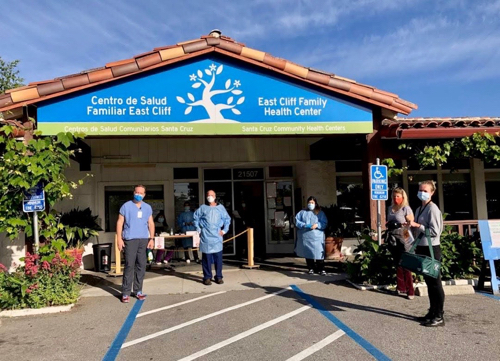Campus News
Campus, Santa Cruz Community Health unite to test underserved community members
As news outlets published stories about celebrities and athletes unnecessarily getting tested for COVID-19, UC Santa Cruz scientists and staff saw an opportunity to provide fast testing for the community’s most vulnerable residents who too often do not have access to the same medical services.

Compelled by values of social justice and equity, UC Santa Cruz and Santa Cruz Community Health, a nonprofit primary care provider for low-income patients, are working together to test the area’s underserved residents for COVID-19.
As news outlets published stories about celebrities and athletes unnecessarily getting tested for COVID-19, UC Santa Cruz scientists and staff saw an opportunity to provide fast testing for the community’s most vulnerable residents who too often do not have access to the same medical services.
“We have the scientific and regulatory expertise on campus to provide rapid, accurate testing for COVID-19,” said Isabel Bjork, director of operations for the UC Santa Cruz Genomics Institute. “Most importantly though, we have committed researchers and staff who want to use their expertise to help our community. It seemed inconceivable not to act.”
The UC Santa Cruz Molecular Diagnostic Lab has run more than 200 tests for the campus health center and for the community health center since gaining state approval on May 1. The lab is providing rapid test results for the Santa Cruz community while also increasing the overall testing capacity in the county. The diagnostic lab is just one example of how UC Santa Cruz serves the community.
Testing is a critical piece in containing the virus’s spread and being able to reopen more parts of the economy. The lab is currently capable of doing 184 tests per day, though it can surge to just under 400, if needed. Scientists are developing plans to further scale up testing.
Bjork previously served on the board of directors for Santa Cruz Community Health and saw the nonprofit as a natural partner in the campus’s initiative to start a diagnostic lab for COVID-19 testing.
The health center, which started in 1974 as a women’s health collective, has grown to provide care to about 12,000 people every year, regardless of their ability to pay, including about 1,700 who are homeless.
“Given that the virus knows no bounds the community’s shared interests are more apparent than ever,” health center CEO Leslie Conner said. “The pandemic reveals how interdependent we are—and the strength in working together.”
As the novel coronavirus hit Santa Cruz County, the health center quickly shifted its operations to focus on tele-health before transitioning its Live Oak clinic into a respiratory site for COVID-19 testing and using its downtown site for urgent care, prenatal visits, and other care that couldn’t be delivered by telephone. The clinic was working with a major lab for COVID-19 tests and had to wait up to six days for results.
“It was starting to get better, but a 24-hour turnaround was really appealing,” Conner said.
The campus first tested health center employees to ensure they were not infected with COVID-19, Conner said, and has started testing its patients, about two dozen per week so far.
The quicker results are critical to reducing the spread of COVID-19. For people who are homeless and test positive, Conner said the county is providing isolation and quarantine sites.
Both the university and health center are driven by a mission of serving the public, the health center through its comprehensive health services, and the university through research, teaching, and community service. Conner said she hopes this partnership will lead to other collaborations down the line.
“The university has resources, scientific experts, and research—these help advance our goals,” she said. “Likewise, we offer an opportunity on the frontlines through which the university can activate an even greater role in advancing equity and social justice.”